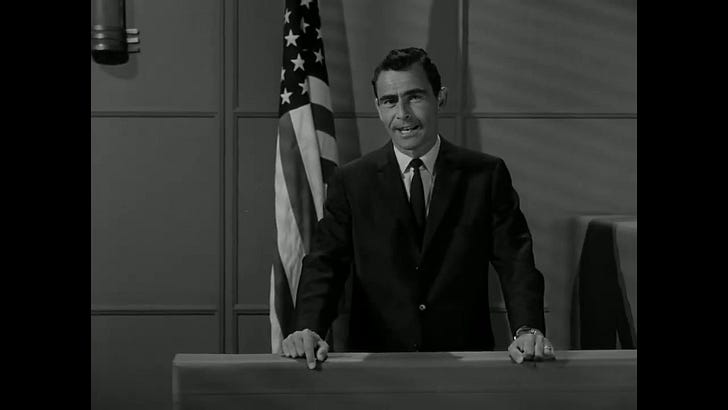Lawyer, professor, and all-around whiz Madiba Dennie joins us for a lively discussion about her debut book, The Originalism Trap, How Extremists Stole The Constitution And How We The People Can Take It Back.
Dennie’s legal and political commentary has been featured in The Atlantic, The Washington Post, and more. She's shared her views about race, gender, and the law on BBC and MSNBC. She's taught at Western Washington University and NYU School of Law. She earned her law degree from Columbia Law School and her undergraduate degree from Princeton University, where she concentrated in politics and earned a certificate in African-American Studies.
Transcribed excerpts from our conversation:
SER: I’m really excited to talk to you about your book … The Originalism Trap, How Extremists Stole the Constitution and How We the People Can Take It Back. The first part is obviously true, and the second part is that glimmer of hope we need, because otherwise, what can we do? There's a blurb for your book from Nation writer Ellie Mystal, and he talks about how the greatest trick conservatives ever pulled was convincing us originalism is even a thing or is real. Can you speak to that a bit, please?
MADIBA DENNIE: Yeah, absolutely. So I think I'll start by saying what originalism theoretically is. Its proponents would tell you that it is an interpretive method that means the meaning of the Constitution is fixed in time. It's frozen, set when the document was enacted, when it was ratified, like early 1800s.
And the meaning doesn't change. It's possible that the applications could change, but the meaning itself remains the same. And this is an idea that only really started getting traction in the aftermath of like the Civil Rights movement and really ramped up during Ronald Reagan's presidency. His department of justice worked very heavily to make originalism the sort of default mode of constitutional interpretation. And it is, as Ellie was saying, how convincing people that it exists is that it falls apart upon closer inspection.
First of all, people don't actually know what the Constitution was understood to mean decisively at a particular point in time, hundreds of years ago. They can make sometimes recent judgments so they can understand what some parts of the population thought it meant or how it was understood among other groups, but they can't say really decisively, at a particular point in time, hundreds of years ago. They can make sometimes recent judgments so they can understand what some parts of the population thought it meant or how it was understood among other groups, but they can't say really decisively, this is what it meant to these people.
And then second, even if they could, that doesn’t necessarily mean it’s right to do so. It doesn't necessarily mean it's good. I think we've seen that a lot in some recent cases in particular. The gun rights cases really come to mind where you have some judges really struggling like, well, this particular modern law says that people who have orders of protection against them for domestic violence offenses shouldn't be allowed to possess guns.
But the founders never cared about domestic violence, so it's unconstitutional to do so. It's just flatly outrageous, right?
SER: [Liberals] have been wrapped up into giving the other side the benefit of the doubt. So for myself, I [once thought], Oh, I get it, like the constitution is written by white people. Men who probably didn't fully believe that I was a person or you were a person. That's not great, but that's the document … It’s kind of silly to think that [the founders] believe that we had rights and they clearly weren't acting that way.
And if we want to make sure that our rights are represented, we should pass laws to do so … But over time, we’ve seen that that's been, that good faith interpretation is a bit of a lie. Is that true?
MADIBA: I think that’s definitely true. And the advice of go pass a constitutional amendment if you disagree with what the Constitution says, I think there are a couple problems there. One is accepting that that is what the Constitution says and that what the Constitution says was not open for debate.
Another issue is the person who’s saying go pass an amendment realistically knows that Congress is not about to pass any amendments, that Congress is an utterly dysfunctional body that nothing's about to happen through.
But perhaps most importantly, the third point is that even if you do pass an amendment, how that amendment is interpreted can dramatically shape what the actual consequences are, how it is implemented.
Like, I think that there’s a reasonable argument that, you know, we did pass amendments. We passed the Reconstruction Amendments. These should be understood as I make the case in the book as fully transformative of the Constitution as the way it was understood before. Say like now that is imbued for real this time with like a commitment to equality and inclusivity, there's like an effort to expand the political community instead of keeping it to this like narrow property owning white guys’ version. And there’s a stated commitment to fighting against discrimination like that’s there in the text but you wouldn’t know it from how the court interprets the Constitution, from how they interpret the Reconstruction Amendments, so even if you do get that [new] amendment, it’s still then how do you how do you turn the words into not just words on paper like how do you actually implement these and I think that’s where interpretation really comes into play
SER: Yeah, and it’s kind of this sort of simultaneous conflict because a lot of the folks [who promote the originalist theory will say], “Look, come on, we all know the Constitution was written by racist white people who are sexist and don’t agree that minorities should have rights, but how dare you say that America was ever at any point a racist country?
{They claim that] judicial activism from liberals and liberal activism [are] inventing rights, but going back to certainly Thurgood Marshall and others, they embrace the idea [that we see in the musical Hamilton] that America is great, has been great, look underneath and beyond the actual period to what they truly meant. That’s more positive, right?
MADIBA: Yeah, I think that’s absolutely right. If you were to take what the [founders] said seriously … if you really believe that all men are created equal and that we have certain inalienable rights, if you really think that freedom from cruel and unusual punishment is a constitutional commitment, then the world would look a lot different.
So there’s something to be said about we are actually being more faithful to the terms by trying to make them real, rather than just sort of resigning ourselves to the past. Because this is a core issue with originalism. It necessarily establishes some version of the past, some version of conservatives' favorite part of history as, a high watermark that people can't pass, that they can't surpass, rather.
Whereas I think if you look at the Constitution in the way that Thurgood Marshall did, in the way that Frederick Douglass did, the Constitution becomes a much more forward-looking, not backwards historical-looking, aspirational document.
And yes, we have had all of these problems throughout history and still ongoing in the present. But there’s value in saying that the country has continued to strive.
Yes, we have had all these horrible things going on, but at every point in history, people have been fighting against it and trying to realize those principles.
And originalism ignores all of that. It pretends that that struggle was never actually happening, that there was one uniform position of an absence of rights, and it just sort of pretends that that underlying contestation wasn’t taking place.
The Originalism Trap, How Extremists Stole The Constitution And How We The People Can Take It Back is available on June 4. Pre-order your copy today.















